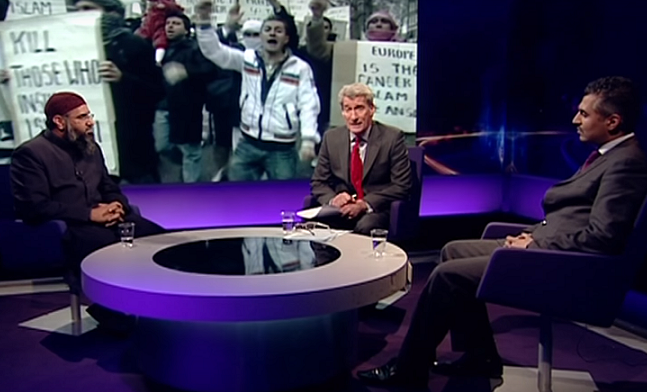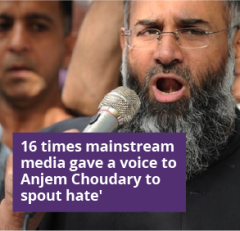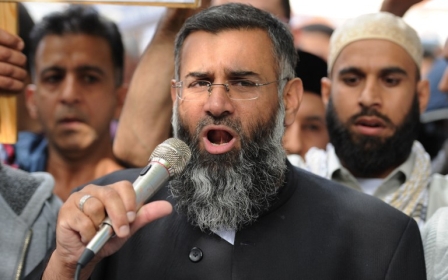From shouting in street corners to BBC News: How the media created Anjem Choudary

The media revelled in writing headlines on Wednesday that celebrated Anjem Choudary’s fate as he and fellow al-Muhajiroun activist Mohammed Rahman faced up to 10 years in jail for urging support for the Islamic State group in YouTube videos. I also celebrated: this loudmouth would finally be silenced.
This is the man who Muslims distanced themselves from and mosques shut their doors to. Many called for his arrest years ago.
But this is also the man who did not need a megaphone to spread his message when he was shunned from street corners. Instead the media, TV and national newspapers gave him a much wider platform so he could preach his pro-terrorism message unchallenged to the alienated and vulnerable of society. The more the community silenced him, the more the media gave him a voice.
Surely it’s now time for the media to be held to account and investigated for its pivotal role in helping to disseminate the message Choudary was desperate to share - and would have failed to have done so effortlessly - if journalists and outlets had not provided him with a pulpit.
It was clear that, for the media, Choudary was the go-to person. I could be confident that for any stories about radicalisation, extremism or even at times Islam, I would see his face on my TV screen, online or in the newspaper.
In fact, for 20 years he relished the media spotlight given to him by the likes of the BBC, Fox News and CNN, who all provided him with a platform on which to amplify his message. He played the part of the villain perfectly, shamelessly and willingly, becoming a household name as the face of an "extremist" Muslim living in a British country "amongst us all". He was the media's poster boy for extremism.
This did, of course, elevate his status to one of even higher standing in the eyes of his supporters and groupies.
The media have questions to answer
Choudary came to prominence in 2001 when he failed to condemn 9/11 - but why were his views even given airtime? Almost every Muslim condemned the attacks, yet they were not given publicity like he was.
When the Muslims Against Crusades protesters burnt a poppy in 2010 and threatened to chant and cause disruption during the one-minute silence on Remembrance Sunday, media outlets covered the story. In doing so they linked Choudary to a protest group of only 35 Muslims out of nearly three million Muslims who live in Britain.
Media stories with Choudary playing the lead character have done nothing but fuel the divide and create further toxicity between Muslims and the wider community especially when his views are equated with those of ordinary Muslims. BBC Radio 4 presenters, such as John Humphreys, stated that he was "representative of part of the Muslim community" which clearly sparked outrage in the Muslim community.
'The Muslim community identified Choudary as an extremist and shunned him years ago'
In my mind there is no doubt that the media are complicit in helping Choudary spread his message unchallenged and that British foreign policy was most likely the oxygen for his narrative. Yes, villains make great headlines and sell newspapers, but at what cost? The impact of all of this will only become apparent over time. Even after his conviction, he is still misleadingly labelled an "Islamic scholar" by some outlets.
There are many questions surrounding this case, including why he was allowed to preach such hateful messages for so long while those who condemn him and his narrative are now left alienated as a result of ill-conceived counter-terrorism legislation.
The Muslim community identified Choudary as an extremist and shunned him years ago. How long will it take the government to realise that Muslims know their own communities well? Working with them, rather than deterring them through counter-terrorism legislation, is the way forward.
The media should be held accountable for their actions, whether it’s for providing platforms for hate-preachers who have been shunned by their own communities or for spreading hate through divisive headlines. There are consequences to hate propagation: lessons must be learned and no one should be above accountability.
- Siema Iqbal is a mother, a doctor and a British Muslim with an opinion based in Manchester. She is currently a partner and trainer at a North Manchester GP practice. She enjoys writing and can often be found public speaking and raising money and awareness for charities both in the UK and abroad. In 2014, she also launched a business, Doctor Aesthetics, while continuing to be a busy mum to two boys.
The views expressed in this article belong to the author and do not necessarily reflect the editorial policy of Middle East Eye.
Photo: Anjem Choudary (L) and Maajid Nawaz (R) with Jeremy Paxman on BBC's Newsnight in 2010 (YouTube)
New MEE newsletter: Jerusalem Dispatch
Sign up to get the latest insights and analysis on Israel-Palestine, alongside Turkey Unpacked and other MEE newsletters
Middle East Eye delivers independent and unrivalled coverage and analysis of the Middle East, North Africa and beyond. To learn more about republishing this content and the associated fees, please fill out this form. More about MEE can be found here.






